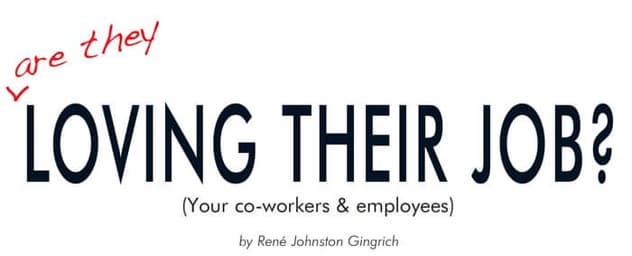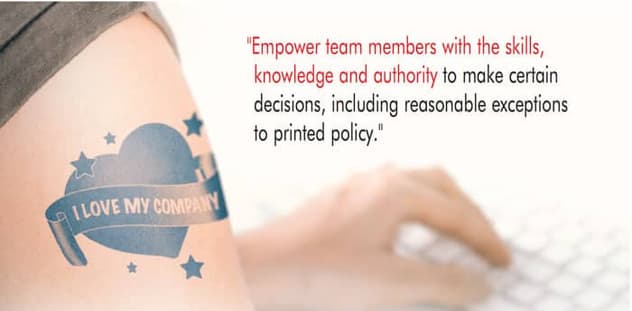
Getting your employees to fully engage in your company's mission and values takes focus and effort. But it's worth it!
Employee engagement is defined as the extent to which employees feel passionate about their jobs, are committed to the organization, and put discretionary effort into their work (Source: CustomInsight.com).
As a successful retail owner or manager, you may ask why you need to be concerned with undertaking the time-consuming and multifaceted process of increasing employee engagement, when the daily operation of your store is so all-consuming. Or, you may think that employees who receive a paycheck should have sufficient incentive to engage and do their job. Dream on!
The fact is that the biggest opportunity for growth and long-term success resides in the quality of the work your employees do. Long-term, no organization can thrive without a passionate and committed workforce.
Engagement-driven management will allow you to better understand the people who work for you, place them appropriately, and retain happy, productive employees. The success of all businesses, including furniture retailers, is largely reliant upon employee satisfaction, team growth, and retention.
5 Key Strategies
So, whether you believe your workforce is pretty good, or you suffer from high turn-over, difficult employee behaviors and poor morale, attending to these five key strategies will improve your operation and your bottom line.
1. Clarify Employee Roles And Expectations
Clarification begins with the hiring process and continues throughout employment. As a manager and leader, it is your job to ensure crystal-clear understanding. Laying the foundation for successful employee engagement by setting a tone from the onset is critical to success.
Whether you are interviewing potential sales team members, managers or delivery drivers, let them know about the mission, core values and practices that define your operation and are responsible for its ongoing success. Remember to be truthful with yourself and the people you interview. Do you want to make the world a better place... or squeeze every last sales, operations and financing dollar out of your business? Remember, especially right now in a tightening labor market, prospective hires are interviewing you as well. And, you can bet they've done their due diligence online, checked out customer reviews and more.
Evaluate each interviewee to get a reading on his or her capacity to embrace what your organization stands for. You may ask them directly to comment on your company mission, for example, "What do you think about our company mission?" or "Are you passionate about what we offer, and if so, why?" You can also ask indirect questions to get an idea of how they interacted with past employers, co-workers or customers. "What kind of working relationships did you have with your co-workers and supervisors at your last job?" or "What were the most important contributions you made to your most recent employer?" You can get a lot of information by asking a couple of open-ended questions.

Once hired, part of the on-boarding process should be to revisit the company’s mission or philosophy. Let every new hire know that a large part of being a successful, contributing team member is to make a personal commitment to measure his or her work by your company's philosophy.
Clarifying roles and expectations are key precipitating factors for engagement. It is critical that every employee have a clear picture of what you expect. An expanded discussion revisits how their role supports the overall success of the organization. Discuss it, deliver the information in writing, have them sign it, repeat it, and employ multiple strategies to ensure understanding.
It is important for each member of your operation to understand the connection between the work they do and the big picture. They must be kept in the loop regarding your store's successes and struggles. Connect individual and team performance to corporate goal achievement and celebrate it. This acknowledgment allows team members to feel appreciated and know that the work they do matters. It is also a great opportunity for employees to connect with and recognize the contributions of other departments in your retail operation. For example, much can be accomplished if your sales team members develop an appreciation for the work the warehouse team does. This should be an ongoing part of managing and coaching.
2. Get To Know The People You Manage
As a manager or coach, you want to know how each team member learns, and what motivates them. Only then can you tailor your coaching style to help them learn quicker and be more effective. It also helps you to find out more quickly if someone is a good fit and likely to succeed. The quicker you can determine this important bit of information, the more rapidly you can move them around or possibly out. This will prevent resentment and general unhappiness from poisoning the overall morale and culture of your organization, and in the long term it will make your job as manager much easier.

Building teams of engaged employees is a balancing act. One bad apple, as they say can spoil the barrel. Get to know each person as an individual. Listen to them, engage and ask questions. Store owners and managers who do this find it to be incredibly valuable and time well spent.
Where To Start
This can be more difficult than it first seems. Depending on the cultural and generational make up of your work force, there may be a wide mix of communication and motivational differences. Individuals possess varying perspectives based on culture, background, and life experiences. The more information you have, the more questions you ask, the more time you invest in listening to the answers, the better you can match their skills and aspirations with specific roles within the workplace. This will lead them to greater fulfillment and higher engagement.
Beyond one-to-one engagement and team building exercises, there are personality tests and other tools that can help you get the specifics you need to fully understand the strengths and weaknesses of team members.
3. Provide Appropriate Workplace Skills & Tools
Engagement driven management requires that you understand what your team members need in terms of skills, tools and resources. These are the elements that employees and teams require to perform at optimum levels and include:
• State of the art technology, such as digital room planners, tablets, delivery tracking and reporting software, traffic counting, lead generation and follow-up systems, etc.
• Physical resources and supplies such as point-of-sale materials, swatching, warehouse, delivery and repair equipment.
• Information on individual and group performance metrics, product availability, delivery, exception tracking, pricing, special orders and more.
• Open and accessible communication with supervisors/coaches, managers and store owners.
Engaged teams are also built upon a strong foundation of training and development. This gives them an opportunity to grow and improve, allowing them to access a mind-set that may be as or more important than monetary compensation.
4. Employee Empowerment To Drive Improvement
Employee empowerment is a management and leadership philosophy that supports and encourages organizational improvement.
Team members are empowered with the skills, knowledge and authority to make certain decisions, including reasonable exceptions to printed policy in the best interests of the company. Ultimately, owners and managers still carry the same responsibility for leadership and accountability.

It is a delicate balance to design consumer-friendly policies and procedures that also protect the organization from financial and other losses. It is almost impossible to provide customers with exceptional service without empowered front-line employees who can deal with unexpected situations.
There are many engagement-related benefits to organizations that empower employees including:
- Faster, more customer-oriented service. When employees are empowered with the authority to make decisions regarding customer service situations it is usually a win-win.
- Empowered employees care more. Employees who feel that their input is valued and respected are more fully committed to organizations.
- Empowered employees are more motivated and better contributors.
- Empowerment enhances the overall culture of the organization.
Furniture stores that empower employees operate more like teams and less like dictatorships. Empowered cultures have better employee retention, happier employees and more satisfied customers. One of the greatest challenges furniture retailers currently face is finding productive, qualified employees. So, if you already employ good people, it's essential that you take measures to keep them happy and engaged. The costs of not doing this can be huge.
5. Coach & Engage With Effective Systems
The effectiveness of coaching cannot be overstated. It provides team members with the information, feedback and reinforcement they need to continually improve. It also gives coaches a built-in opportunity to engage with team members. Ongoing coaching is much like eating healthy or exercising a little bit every day. It is a commitment to excellence, producing results and minimizing the likelihood of encountering problems. The topics on which you choose to coach will vary depending on your most pressing needs. Collect and use all the metrics at your disposal, but don’t limit your attention to just the numbers.
It is critical for you to structure systems that support engagement with employees. Without structure and strategy, reaching your goals and creating a fully functioning team is much more unlikely.
One critical aspect of coaching all retail organizations should embrace, is to expressing appreciation. An appreciation or awards program is critically important. Celebrate your team's wins, and this too should be structured.
Conclusion
Applying the Five Key Elements of Engagement Driven Management is not for the faint of heart, but it's worth the effort. Highly engaged employees are more productive, motivated and stick around longer. That means that you as a manager or leader have to do a lot less babysitting and troubleshooting.
Few of us get to spend 40, 50 or 60 hours a week with our friends and family, but we easily spend that amount of time at work. Why wouldn’t you want that time to be the best possible experience, every day and for everyone.
Employee Engagement At Some Of The Best Companies
When studying the success of Fortune 500 companies or examining the list of "The Best Companies to Work For" there are many recurring themes. Some describe owing their success to innovation or a complex acquisition strategy, but most will also include the importance of building a highly functioning team of engaged employees.
Engagement at Deloitte: "The focus on constant improvement, learning, and development at Deloitte is why I stay at the firm. We invest in our people's individual development and wellbeing on the job, through informal and formal learning and beyond."
Engagement at Wegeman’s: Employees say, “There’s a lot of love and caring” at this 100-year-old family-owned grocery chain, where workers have flexible schedules, ample promotion opportunities, and “feel like family.”
Engagement at Salesforce: Staffers gush about the “Ohana” culture (“family” in Hawaiian) that embraces equality, service, and innovation.